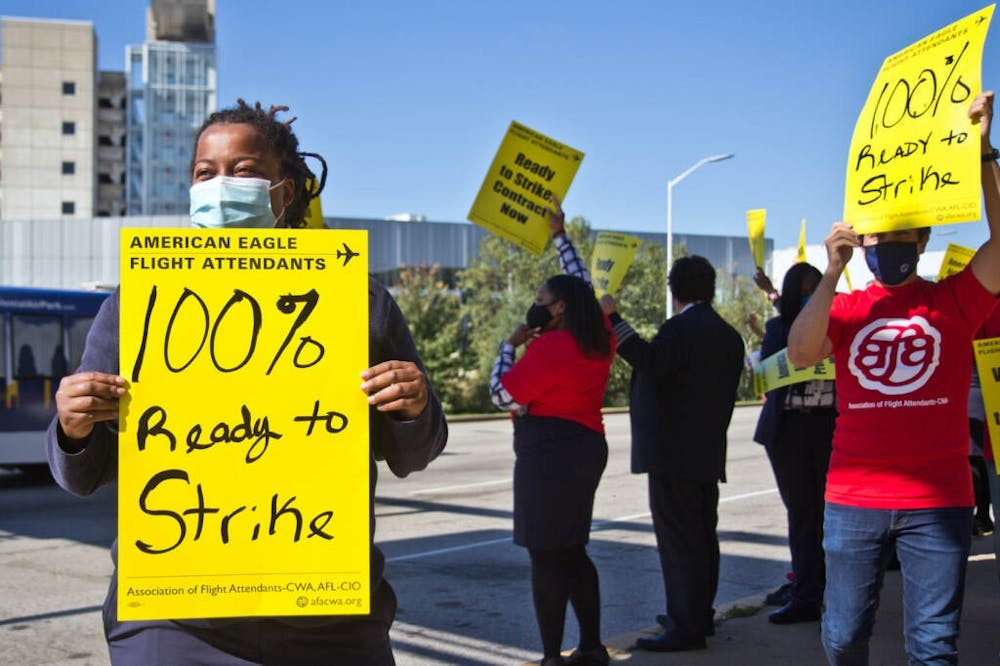2021 was a year for workers. COVID-19 affected nearly 22 million people who were laid off in the first few months of the pandemic, simultaneously giving rise to the label “essential worker”—individuals who risked their lives to keep our economy and society running. While this population was designated to be economically necessary, corporations failed to translate their "appreciation" into tangible support. Workers were continued to be paid low wages, denied hazard pay, and even in the midst of a pandemic, not given proper access to personal protective equipment (PPE) like masks or face shields.
Now, the economy is reopening, but employers and businesses are scrambling for workers in the face of a national “labor shortage”. This phenomenon is frequently centered around the narrative of people opting for unemployment benefits instead of working. But the “labor shortage” isn’t a problem with a lack of workers, it’s a problem of low–quality jobs that exploit, undervalue, and underpay their employees, and workers are refusing to stand by these dismal working conditions.
In Pennsylvania, essential jobs include those in the health care, public transit, agriculture, and food processing industries. A recent study by the Wharton School and Independence Blue Cross found that essential workers in the state—predominantly low–income Black and Latinx residents—are 55% more likely to test positive for COVID-19 than those who are able to stay home. The reopening of businesses hasn't meant that coronavirus cases have stopped; rather, essential workers continue to bear the brunt of the health crisis and exploitative work environments.
The pandemic has pushed workers around the country to demand the change and compensation they deserve. Although organized labor faced losses in influence and power in the past few decades, 2021 has seen an uptick in union activity. Dozens of workplaces across the nation have gone on strike since August, and labor unions are receiving more public support than they’ve ever had since 1965. Rutgers University professor Francis Ryan contends that current labor organizing efforts are in a historic moment where ”workers are asserting their power in ways that haven’t been done in over a generation.”
Philly workers are undoubtedly contributing to this national momentum for labor organizing. During #Striketober, a wave of labor unions in Pennsylvania threatened strikes, job actions, and walk–offs to demand things like better pay and fairer workloads. From the Philadelphia International Airport to the Kellogg Company Plant, workers in PA have been clear about their discontent and readiness to organize.
Keturah Johnson— president for Piedmont Airlines in the Association of Flight Attendants-Communications Workers of America (AFA-CWA Local Council 61)—says working for an airline during the pandemic has been very challenging. At the beginning of the pandemic, despite little information on the specific implications of COVID-19 on the airline industry, AFA-CWA's Piedmont Airlines Council union focused on acquiring PPE and protecting their paychecks and jobs. Since then, Johnson has helped implement policies and procedures that protect workers’ rights, like paid pandemic leave for flight attendants and Piedmont employees, which hadn’t been in place initially.
This October, Piedmont flight attendants based out of Philadelphia International Airport voted 100% in support of authorizing a strike. For Johnson, this means that “everyone who voted ... [has] had enough. They're demanding change because they deserve [it] and need better ... And we're going to continue to fight until we get it.” The union is currently in contract negotiations to implement better pay.
Johnson says the strike authorization is helping to bring awareness to how workers are treated in the airline industry. For instance, it's not widely known that flight attendants are only paid once the plane doors close, meaning that they are not compensated for the time it takes to check emergency equipment, help passengers board and exit the plane, and clean the plane after the flight. Averaged out for an entire shift, a day's pay for Piedmont flight attendants can be less than the federal minimum wage. Now with COVID-19, flight attendants are additionally tasked with enforcing mandatory mask policies—a part of the job that has led to harassment and threats from unruly passengers.
However, Johnson shares that being part of the current labor movement has been “pretty incredible.” Garnering a 100% support rate to authorize a strike in itself is remarkable and a significant feat the union will use as they move forward with negotiations.
Philly continues to be an integral part of the nationwide movement of workers that are tired of being exploited and treated as expendable. This year, we’ve seen that change is possible as local unions organize and take action to demand better pay and working conditions. They’re making their power known, and in the process, changing the labor landscape as we know it.

